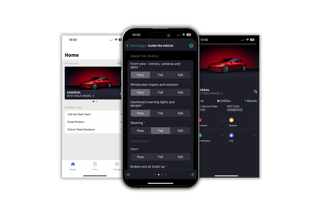Government grants to allow widespread installation of workplace electric vehicle charging points would be a major step forward in fleet adoption of ultra-low emission vehicles (ULEVs), says Chevin Fleet Solutions.
Ashley Sowerby, managing director of Chevin, said: “There have been several stories in the press saying that the Government will announce workplace EV charging grants this summer and we believe that this would be a major boost to adoption.
“Having a charging point at your place of work or client sites would make the experience of operating a fleet EV much more practical.
“Also, we believe that simply having a charging point fitted at work will create a degree of driver and corporate curiosity about the whole subject of EVs and their possibilities for fleet. It is all about creating momentum.”
Sowerby said that he believes a “tipping point” for EVs is approaching. “We are still at a stage where the charging network is relatively small but there is a spirit of co-operation,” he said. “Some private individuals will even let you use the charging point on their drive – these individuals can be located using some of the apps available for EV users.
“This is good but we need to move to a position where charging points are simply part of the landscape, in order for fleets to consider ULEVs as a mainstream option.
“Government support to do this would be a very positive move. It is another step on the road towards making EVs part of the normal fleet proposition, especially bearing in mind the current London consultation on air quality and the fact that programmes such as the Go Ultra Low cities are coming into effect.”
This week, Sowerby has himself taken delivery of Chevin’s first EV in the shape of a Tesla Model S. He has had charging points fitted at home and at the company’s premises, the latter of which is at least partially powered by the company’s 20kW electric roof, which has produced around 18,000kWh in the last year alone.
Amongst Chevin’s team, other drivers scheduled for vehicle replacement this year are also looking at EV and hybrid options.
However, Sowerby said, a greater choice of models was still required to help boost adoption. “The absence of EV models in the mid-size executive sector and the high cost of hybrids has to a certain extent restricted options,” he said. “We believe that a wider choice is urgently needed.”






















IanM - 21/06/2016 10:43
We have charge points at our offices for our Kangoo ZE's which gives employees with PHEV's and EV's the opportunity to charge their vehicles as well. The only issue, as pointed out by our HR dept, is that it, technically, incurs a BIK charge as we are supplying them with fuel for their vehicle with no way of calculating a cost for them. At the moment we've put the private use side of vehicle charging on hold until we find a solution.